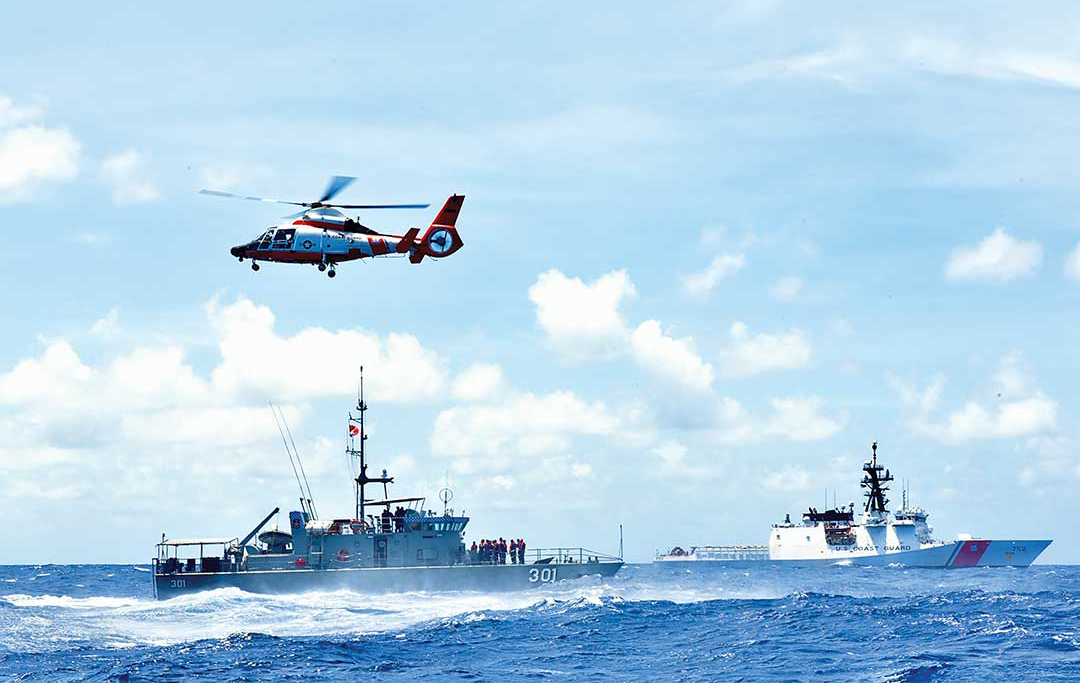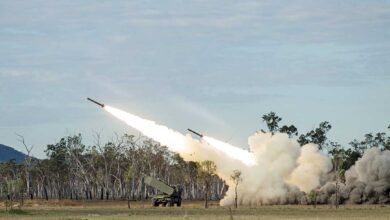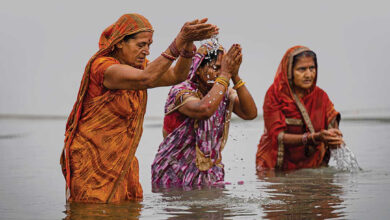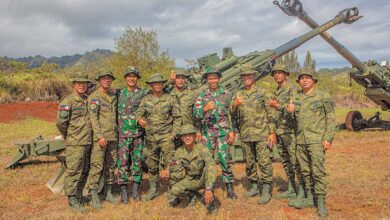Stepping Up in the Pacific

Allies and partners bolster Pacific island nations against array of security threats
FORUM Staff
Scattered across an expanse of ocean that accounts for about 15% of the Earth’s surface, the roughly 30,000 Pacific islands — many of them uninhabited atolls — are home to just 12 million people, little more than the population of the Indonesian capital of Jakarta. The livelihoods of many Pacific Islanders are held fast to the riches of their mighty ocean or to the drawing power of their exquisite homelands, tropical jewels atop a shimmering turquoise.
Remote as they may be, Pacific island nations and territories find themselves in the midst of many of the globe’s swirling challenges, buffeted by some of the great tests of the era — from rising seas and depleted resources to pandemic lockdowns and geopolitical tussles. “The Pacific region’s security environment has become increasingly complex,” according to the Pacific Islands Forum (PIF), a political and economic policy group of member states founded in 1971 to foster peace and prosperity through regional and international cooperation. “Pacific communities are vulnerable to security threats from transnational crime groups, climate change, terrorism, natural disasters, political instability and internal conflicts. Consequences include domestic disorder, diminished border revenues, increased local crime and weaker law enforcement.”
Above the waves and below the surface, efforts are underway by allies, partners and like-minded nations to fortify the region against a storm of economic, climatic and security threats, including the People’s Republic of China’s (PRC’s) attempts to exert influence for its own gains.
“The Pacific is evolving as complex disruptors intensify and the increasing presence of external actors comes to bear,” the New Zealand Defence Force (NZDF) noted in its report “Advancing Pacific Partnerships: A Framework for Defence’s Approach to the Pacific,” published in October 2019. “Greater competition for influence in the Pacific will intersect with this suite of complex disruptors. External actors seeking to enhance their regional presence may leverage these issues as vectors of influence. More broadly, the pace, intensity and scope of engagement by external actors, who may not always reflect our values across their activities, are at the heart of a growing sense of geostrategic competition that is animating many nations’ renewed focus on the Pacific.”

CHINA’S ‘EXPANDING ASSERTIVENESS’
Case in point: Kiribati. Among the world’s remotest nations, it sits almost midway between Australia and the United States. Although its tiny population of 110,000 could fit comfortably inside India’s biggest cricket stadium, Kiribati’s 33 coral atolls are sprinkled across an immense sweep of the Pacific, making it the only nation to straddle all four of Earth’s hemispheres and giving it an exclusive economic zone (EEZ) of more than 3 million square kilometers — larger than the land area of India. Under the United Nations Convention on the Law of the Sea, Kiribati, like other nations, has sovereign rights to explore and exploit the natural resources within its EEZ. That includes fisheries, oil and gas, and minerals — a trove of resources that has drawn the eye of a rapacious PRC.
In May 2021, Kiribati’s government, which dropped its diplomatic ties with democratic Taiwan in favor of communist Beijing in 2019, announced that the PRC was providing financial backing for a feasibility study into upgrading an airstrip on one of the island nation’s atolls. The government said the project would support tourism, Reuters reported. Some lawmakers, however, have expressed concern over China’s interest in the airstrip, which served as a United States military base in World War II, and questioned whether the project would be part of the PRC’s One Belt, One Road, an infrastructure scheme widely panned for its predatory lending practices. A month later, security concerns related to Chinese involvement led to the shelving of a World Bank-led project to install undersea cables to enhance communications on Kiribati and two other Pacific island nations, the Federated States of Micronesia and Nauru. The infrastructure would have linked with an undersea cable that connects with the U.S. territory of Guam and is used mainly by the U.S. government, according to Reuters. A Chinese company submitted the lowest bid, but U.S. and island nation officials warned that Chinese firms are required to cooperate with Beijing’s intelligence and security services.
The PRC’s involvement in Kiribati’s infrastructure projects raises “the prospect of Chinese military bases, or, at least initially, potential dual-use facilities, being established right across the center of the Pacific,” noted a September 2020 article in The Strategist, a publication of the Australian Strategic Policy Institute, a Canberra-based think tank. “These facilities would give China control over the world’s best tuna fishing grounds plus swaths of deep-sea mineral resources, and a presence near the U.S. bases at Hawaii, Kwajalein Atoll, Johnston Atoll and Wake Island. They would also be positioned directly across the major sea lanes between North America and Australia and New Zealand.”
Beijing’s “expanding assertiveness” is being felt across the Pacific islands, according to Alexander B. Gray, a senior fellow in national security affairs at the American Foreign Policy Council. Palau’s newly elected president, Surangel Whipps Jr., called out China’s bullying of his island nation in January 2021, a month after Palauan maritime authorities assisted by the U.S. Coast Guard seized a Chinese vessel suspected of illegally harvesting sea cucumber in Palau’s waters. The PRC’s massive distant-water fleet is considered the world’s biggest perpetrator of illegal, unregulated and unreported (IUU) fishing, which accounts for roughly 30% of all ocean fishing. “With regard to natural resources, China has been aggressively taking advantage of fishing resources in the region,” Satohiro Akimoto, president of the nonprofit Sasakawa Peace Foundation USA, wrote in The Japan Times newspaper. “As China has depleted resources in the waters near the coast to feed increasingly demanding consumers at home, the Pacific island region presents opportunities in its vast, rich waters.”
Beijing also wields economic coercion, including retaliating against Palau for its diplomatic ties with Taiwan by essentially banning visits by Chinese tourists, thereby damming a crucial revenue stream for the popular tourist destination. The “challenges confronting the smallest Pacific islands should be front of mind,” Gray, a former Oceania and Indo-Pacific security director at the U.S. National Security Council, wrote in The Diplomat magazine in May 2021. “Not only do these states have some of the region’s most strategic geography, but they are also committed democracies who have long sought to align with U.S. interests in international forums and at the United Nations.”
‘ARENAS OF COMMON PURPOSE’
Collaborative efforts to address those challenges are gathering pace as democratic allies and partners increase their engagement in the region, at least in part, to counter the Chinese Communist Party’s hegemonic ambitions. “One of the things that we are looking to do over the course of the next little while, working closely with allies like Australia, New Zealand, Japan and others, is to convene with Pacific island nations to talk about arenas of common purpose,” Kurt Campbell, the U.S. National Security Council’s Indo-Pacific affairs coordinator, said during a June 2021 event hosted by the Center for a New American Security think tank. “These are islands which we have enormous historical moral and strategic interests in,” Campbell said, according to Reuters. “And, increasingly, again this is an arena of competition both in terms of values, their role at the United Nations, their health challenges, climate change, their potential role militarily, healthy fishing stocks, just down the list.”
Japan and the U.S. are dialogue partners of PIF (Australia and New Zealand are members) and contribute significantly to the forum. Tokyo has provided U.S. $580 million in development assistance to the region since 2018, while Washington contributes U.S. $350 million annually, according to the respective governments. Additionally, the U.S. Agency for International Development’s Climate Ready project has earmarked U.S. $24 million between 2017 and 2022 to help Pacific island nations and territories mitigate the impact of climate change.
The U.S. also has bilateral shiprider agreements that allow local law enforcement authorities to fight crime within their nation’s EEZ while aboard U.S. Coast Guard vessels. In 2020, the U.S. Army created Operations in Pacific Island Countries to increase its regional presence and assist island nations and territories with the design and implementation of civic aid projects, military and security operations and exercises, and humanitarian assistance and disaster relief programs.
Also in 2020, the U.S. Pacific Fleet hosted the 27th iteration of Rim of the Pacific (RIMPAC), a biennial exercise designed to enhance interoperability and strategic maritime partnerships, which are critical to ensuring the security of sea lanes in support of a Free and Open Indo-Pacific. Conducted at sea around the Hawaiian Islands over two weeks in August, RIMPAC 2020 included 22 ships, 1 submarine and more than 5,300 personnel from 10 partner nations.
In addition to providing financial support in sectors such as education, health and infrastructure, Japan jointly runs the Tokyo-based Pacific Islands Centre, founded in 1996 to assist PIF members with sustainable economic development through the promotion of investment, trade and tourism, according to Japan’s Ministry of Foreign Affairs. Japan also is boosting defense cooperation and exchanges with Pacific island nations as part of its vision for a Free and Open Indo-Pacific, according to its Ministry of Defense. That includes organizing the Japan-Pacific Islands Defense Dialogue — the first-such multilateral defense minister-level meeting — and promoting aircraft visits and port calls by Japan Self-Defense Forces units. “Japan has a unique role to play here as a key ally of the U.S. and as an Asian nation with a long, continuing involvement in the Pacific island nations,” Akimoto wrote in The Japan Times in December 2019. “Japan can also emphasize the benefits of economic development and environment sustenance through the values it espouses: rule of law, quality infrastructure and human security.”

A REGIONAL RESET
Unveiled during a PIF leaders meeting in 2016, Australia’s Pacific Step-up strategy is among the nation’s “highest foreign policy priorities,” with more than U.S. $1 billion committed to the region in 2020-21 alone, according to Australia’s Department of Foreign Affairs and Trade. During the COVID-19 pandemic, which devastated the region’s vital tourism and service-based industries, that support expanded to critical supplies. “Australia is the single largest development partner for these nations,” Australian Prime Minister Scott Morrison told the U.N. General Assembly in September 2020. “So, we’ve provided personal protective equipment, testing equipment, medical expertise, and we’re maintaining an essential services and humanitarian corridor so experts and supplies can get in and out.”
Australia’s Pacific Patrol Boat Replacement project, meanwhile, is acquiring 21 vessels through 2023 to replace patrol boats the country donated to 12 Pacific island nations and Timor-Leste between 1987 and 1997, according to the federal government. Part of Australia’s Pacific Maritime Security program, the U.S. $250 million replacement project will boost the island nations’ ability to patrol their borders, counter IUU fishing and other maritime crime, and conduct search and rescue operations. The 11th of the replacement Guardian-class patrol boats, the RKS Teanoai II, was presented to Kiribati in June 2021.
Like its neighbor across the Tasman Sea, New Zealand has stepped up its regional engagement. In a February 2019 statement, Morrison and New Zealand Prime Minister Jacinda Ardern noted that “the prosperity and security of the Pacific was of fundamental importance” to their nations, agreeing to amplify their partnerships with island nations and territories. Under its Pacific Reset policy launched in 2018, New Zealand has augmented its aid funding, increased the frequency of ministerial-level meetings and created more than a dozen new diplomatic and development posts focused on the region. In mid-2020, it established a resident defense advisor in Tonga to coordinate operations such as disaster response. The NZDF is providing professional leadership training to island nations “to embed the fundamentals of ethical and effective leadership among Pacific security personnel,” while also enhancing and realigning its resources to support amphibious operations and maritime patrols in the Pacific region. “An array of challenges facing the Pacific, from climate change to geostrategic competition, requires more from us and our like-minded partners,” the NZDF’s “Advancing Pacific Partnerships” report noted.
Indeed, as they face threats both immediate and existential, Pacific island nations will lean on Australia, Japan, New Zealand and the U.S., as well as friends elsewhere in the Indo-Pacific, Europe and around the globe. “As a small nation, we can easily be infiltrated, and we depend on our partners to protect us and give us security,” Whipps, the Palauan president, said during a March 2021 trip to Taiwan. As if to heighten Whipps’ concerns about the fragility of sovereignty, China’s People’s Liberation Army sent 10 military aircraft into Taiwan’s air defense identification zone while he visited the self-governed island claimed by Beijing.
“With Beijing’s ambitions growing rapidly,” Gray, of the American Foreign Policy Council, wrote in The Diplomat, “it will require a combined effort by Washington and its allies to ensure the Indo-Pacific’s smallest states continue to enjoy independence, security and prosperity.”
Pacific Partners
building enduring relationships in Pacific island nations
Operations in Pacific Island Countries
Operations in Pacific Island Countries (OPIC) is a United States Army Pacific-focused effort dedicated to strengthening relationships throughout Oceania. Committed to a Free and Open Indo-Pacific, OPIC reinforces the historical ties of friendship and solidarity between the U.S. and Pacific island nations, including their shared values of personal freedom and global autonomy, embedded with a strong sense of social responsibility. By connecting with military, government and societal partners, the OPIC team uses a vast network of subject-matter expertise to create value across Oceania.
OPIC is composed of Soldiers from all components of the U.S. Army, including active duty, Army Reserve and National Guard. It was officially stood up in 2020, and it mainly includes units and members of the 9th Mission Support Command (9th MSC) located at Fort Shafter Flats, Hawaii, where OPIC is headquartered. With personnel already in Oceania — which includes Melanesia, Micronesia and Polynesia — the 9th MSC is a natural fit for this mission, especially considering its deep ties to the region and that many Soldiers within the mission call Oceania their familial and ancestral home.
“The great thing about the 9th MSC is that in our formations are Soldiers that are actually from [Pacific island] countries,” said U.S. Army Brig. Gen. Timothy D. Connelly, commanding general of the 9th MSC, who took command of OPIC in June 2021. “They are amazing Soldiers with great U.S. Army-acquired military skills and training. They bring to us something that is so unique, and that is the culture and the language and the familiarity of being from, in many cases, the South Pacific.”
As the Oceania effort took shape in early 2020, Oceania Pathways Teams were created to support Pacific island nations. The teams include civil affairs professionals along with cultural experts and are purposely built to accomplish many objectives, with the top two being building host nation capacity and reinforcing relationships across Oceania.
Oceania Pathways Teams have used U.S. Army and sister service engineering, medical and veterinary capabilities to assist throughout the region. The 9th MSC has also sent teams to engage with Pacific island countries for disaster response planning, security cooperation and Soldier skills exchanges. Military-to-military training exercises, such as Pacific Pathways, increase the readiness of U.S., allied and partner forces. The blending of cultural expertise, civil affairs and the assets that OPIC’s whole-of-government approach brings to the table results in lasting partnerships and sustainable growth.
OPIC has not been without its challenges. Right after the unit launched, the COVID-19 pandemic arrived, dramatically impacting operations. “It forced us to stop everything we were doing and rework our plan moving forward,” said Maj. Eric Morey, who then served as its chief of operations. “From an operations perspective, it was an incredible challenge to figure out. It required a lot of creative solutions, patience and teamwork across all components, allied partners and Oceania countries.”
Despite the obstacles, OPIC moved teams forward to support Pacific island nations. Fiji, the Marshall Islands, Palau, Papua New Guinea and Timor-Leste were the first to benefit from the U.S. Indo-Pacific Command’s (USINDOPACOM’s) increased commitment to Oceania. Supporting the COVID-19 response in these partner nations became a major focus for OPIC.
Though the pandemic presented challenges into 2021, OPIC continued to build capacity and increase its reach to more Pacific island nations. Pivotal to its success has been its ability to provide tailored solutions for each host nation. A key ingredient of that winning formula is the deep cultural affiliation and alignment OPIC has with host nation partners.
Every aspect of its operations includes cultural immersion and education. During a recent physical fitness session, OPIC members took paddling lessons. Led by Master Sgt. Kris Kaopuiki, Soldiers learned the basics of this ancient way of navigating. “There are few better ways to understand, experience and be in touch with the people and cultures that we are helping than paddling,” Kaopuiki said. “The traditions and disciplines of this sport are deeply tied to these ancient societies.” OPIC personnel have also immersed themselves in cultural events, such as kava ceremonies and Pacific Islander heritage nights.
Designed and spearheaded by U.S. Army Pacific, Pacific Pathways seeks to increase the readiness of U.S., allied and partner forces through military-to-military training exercises. The exercises are spread across the Indo-Pacific and have recently included a growing list of Oceania countries.
OPIC entered 2022 as a maturing asset that USINDOPACOM relies upon to continue building strategic relationships and to provide a sustaining presence in the region. From senior leader engagements, joint exercises, conferences, and humanitarian assistance and disaster response planning to COVID-19 support, engineer engagements, and civic actions and projects, OPIC brings an enormous menu of capabilities and value to Pacific island nations. “The U.S. and the Pacific island countries in Oceania share many fundamental values around democracy and a spiritual approach to human existence that embeds respect for the individual within a strong social context,” said U.S. Army Col. Blaise Zandoli, OPIC’s deputy commanding officer. “Our shared values and mutually beneficial practical connections make partnerships a natural outcome.”





